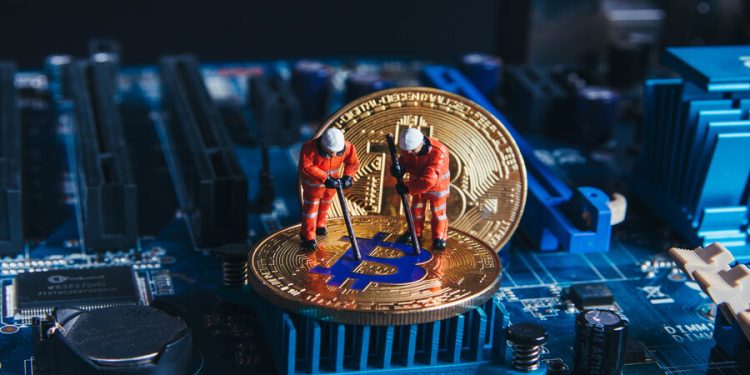Cryptocurrency mining is the process of verifying transactions on a blockchain network and adding them to the blockchain ledger. This process involves solving complex mathematical equations using specialized hardware and software. In this article, we will explore the role of cryptocurrency mining in the market, including the benefits and challenges of mining, and the impact of mining on the overall cryptocurrency market.
Introduction
In this section, we will provide an overview of the topic, outlining the basic concepts and terminology related to cryptocurrency mining. We will also introduce the main points that will be discussed in the article.
What is Cryptocurrency Mining?
Cryptocurrency mining is the process of verifying transactions on a blockchain network and adding them to the blockchain ledger. This process involves solving complex mathematical equations using specialized hardware and software.
How Does Cryptocurrency Mining Work?
Cryptocurrency mining involves the use of specialized hardware and software to verify transactions on a blockchain network. Miners compete to solve complex mathematical equations, with the first miner to solve the equation being rewarded with a newly minted cryptocurrency.
What is the Role of Cryptocurrency Mining in the Market?
Cryptocurrency mining plays a critical role in the market, as it helps to maintain the security and integrity of the blockchain network. In addition, mining provides an important source of revenue for miners, who are compensated with newly minted cryptocurrency for their work.
Benefits of Cryptocurrency Mining
In this section, we will examine some of the key benefits of cryptocurrency mining, including increased security and decentralization, and the potential for miners to earn revenue.
Increased Security and Decentralization
Cryptocurrency mining helps to increase the security and decentralization of the blockchain network by requiring a consensus among miners to validate transactions.
Potential for Revenue
Mining can be a profitable venture for individuals or organizations that have the necessary hardware and software to mine cryptocurrencies. By earning newly minted cryptocurrency as a reward for their work, miners can generate revenue while contributing to the security and integrity of the blockchain network.
Challenges of Cryptocurrency Mining
In addition to the benefits, there are also several challenges associated with cryptocurrency mining, including high energy consumption, increasing competition, and the potential for centralization.
High Energy Consumption
One of the main challenges of cryptocurrency mining is its high energy consumption. Mining requires a significant amount of computational power, which can lead to high energy costs and environmental concerns.
Increasing Competition
As the popularity of cryptocurrencies has grown, so too has the number of miners competing to validate transactions. This has led to increasing competition and a reduction in profitability for individual miners.
Potential for Centralization
Finally, there is a concern that cryptocurrency mining could lead to centralization, as larger mining operations are able to outcompete smaller miners and control a larger portion of the network’s computational power.
Impact of Mining on the Cryptocurrency Market
In this section, we will examine the impact of mining on the overall cryptocurrency market, including the effect of mining on cryptocurrency prices and the potential for mining to drive innovation in the industry.
Effect on Cryptocurrency Prices
Mining can have a significant impact on cryptocurrency prices, as changes in the mining process or the introduction of new mining hardware can affect the supply and demand of the cryptocurrency.
Potential for Innovation
Mining can also drive innovation in the cryptocurrency industry, as miners are incentivized to develop new hardware and software solutions that can improve efficiency and reduce costs.
Centralization vs. Decentralization
One ongoing debate in the cryptocurrency industry is the balance between centralization and decentralization. Some argue that mining can lead to centralization, as larger mining operations are able to outcompete smaller miners and control a larger portion of the network’s computational power. Others argue that mining can promote decentralization, as it allows individuals and organizations to participate in the network and earn rewards for their work.
Mining Pools
Another important aspect of mining is the use of mining pools. Mining pools are groups of miners who work together to solve complex mathematical equations and earn rewards for their work. By pooling their resources, miners can increase their chances of earning rewards, but also reduce the overall decentralization of the network.
Regulatory Considerations
Finally, there are several regulatory considerations related to cryptocurrency mining. In some jurisdictions, mining may be subject to regulations related to energy consumption, environmental impact, and taxation. As the cryptocurrency market continues to evolve, it will be important for stakeholders to work with regulators to develop appropriate frameworks that can promote innovation and growth while also protecting consumers and the environment.
By addressing these and other subtopics related to the role of cryptocurrency mining in the market, stakeholders in the industry can work together to develop new solutions and initiatives that can help to promote greater efficiency, sustainability, and decentralization in the mining process. This, in turn, can help to ensure the continued growth and success of the cryptocurrency market.
Security Concerns
One important aspect of cryptocurrency mining is the potential for security concerns. As mining has become more popular, there has been an increase in the number of scams and fraudulent mining operations. It is important for individuals and organizations to conduct due diligence before investing in mining operations, and to take appropriate steps to secure their mining hardware and software.
Evolution of Mining Technology
Another important aspect of mining is the ongoing evolution of mining technology. As the cryptocurrency market continues to evolve, new mining hardware and software solutions are being developed that can improve efficiency, reduce energy consumption, and increase profitability. Keeping up with these developments is important for miners who wish to remain competitive in the market.
Impact of Halving Events
Finally, it is worth noting the impact of halving events on mining profitability. Halving events occur when the mining reward for a particular cryptocurrency is cut in half, and can have a significant impact on mining profitability. Understanding the timing and impact of halving events is important for miners who wish to maximize their returns on investment.
By considering these and other subtopics related to the role of cryptocurrency mining in the market, stakeholders in the industry can work together to develop new solutions and initiatives that can help to promote greater efficiency, security, and profitability in the mining process.
Conclusion
In conclusion, cryptocurrency mining plays a critical role in the market by maintaining the security and integrity of the blockchain network, providing a source of revenue for miners, and driving innovation in the industry. While there are challenges associated with mining, including high energy consumption and increasing competition, stakeholders in the industry can work together to develop new solutions that can address these challenges and promote greater sustainability and efficiency in the mining process.









